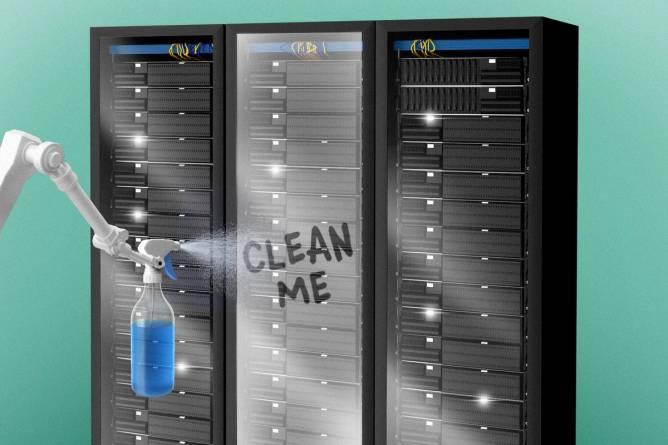|
Hello, Thursday! Before you buy yourself a meal for lunch, maybe check if the chap in front of you is paying the same price.
In today’s edition:
 Open coffers Open coffers
🩺 BotDoc
🩸 Red alert
—Tom McKay, Billy Hurley, Caroline Catherman, Patrick Lucas Austin
|
|
Francis Scialabba
|
The Department of Homeland Security (DHS) is whipping out its wallet to secure open-source software, according to National Cyber Director Harry Coker, Jr.
Speaking at the DEF CON 32 conference in Las Vegas this month, Coker announced the Open Source Software Prevalence Initiative, which will pull from $11 million in funding under the $1.2 trillion infrastructure act passed by Congress in 2021.
“We know that open source underlies our digital infrastructure, and it’s vital that, as a government, we contribute back to the community as part of our broader infrastructure efforts,” Coker told the audience.
As CIO Dive noted, Coker’s office recently released a report calling for the federal government to incentivize wider usage of and education in memory-safe programming languages, especially with respect to translating older code.
Read the rest here.—TM
|
|
PRESENTED BY AMAZON WEB SERVICES BIZAPPS
|
|
Business agility is the overarching goal for many an org, and AI could be one of three keys to achieving it. The other two? Automation and low-code development. (Actually, there’s one more: caffeine. But you knew that.)
To discuss the finer points, Amazon Web Services (AWS) is hosting a webinar covering how AI, robotic process automation (RPA), and low-code/no-code platforms on AWS can help enhance efficiency and simplify tasks.
Guest industry leaders from Forrester and leading AWS partners will showcase how you can power your digital transformation with these three keys. Talk about unlocking boosted performance.
All you have to do? Register here.
|
|
Dlinca/Getty Images
|
If you’re hoping a well-crafted prompt and a large language model can save you from sifting through 54,000 hospital reports, don’t throw out your staple remover just yet.
Columbia University findings published on August 13 in JAMA Network Open revealed that a large language model (LLM)—a computational model that understands and generates text—couldn’t outperform a simpler text-recognition option known as “text-string” search.
More troubling, according to the report’s lead researcher: The LLM couldn’t replicate its findings.
“It’s no guarantee that if you repeat the experiments, you’re going to get the same results,” Kathryn Burford, postdoctoral researcher at Columbia University Mailman School of Public Health, told IT Brew. “And that’s a major, major problem for scientists.”
The study:
-
Paperwork. The researchers used OpenAI’s computational model, ChatGPT-4, to peruse notes from 54,569 emergency-department visits. The goal: Find patients in the dataset who wore helmets before experiencing their bike, scooter, or hoverboard-related injuries.
-
Not not helmet. LLMs had trouble identifying negations, according to the report, including terms like “without a helmet,” “w/o helmet,” “and “unhelmeted.” “The LLM often hallucinated and was consistent in replicating its hallucinations,” the team concluded.
-
String theory. The large language model did not surpass text-string search, a code-based detection of human-researched phrases (like “unhelmeted”) in large datasets. According to the study, the LLM had “moderate to weak agreement with a simple string search method,” unless the prompt contained all human-labeled text strings.
Read more here.—BH
|
|
Picture Alliance/Getty Images
|
When hackers set their sights on a blood bank, the stakes aren’t just high, they’re life or death.
The nation saw that firsthand after a ransomware attack on July 29 against Florida-based blood bank OneBlood disrupted patient care, delayed elective procedures, and prompted the bank to tell more than 250 southeast hospitals to temporarily activate critical blood shortage protocols.
The hack knocked some of OneBlood’s systems offline, forcing staff to manually perform normally automated steps like blood labeling, according to a press release, which significantly slowed down deliveries to hospitals. In response, blood banks nationwide scrambled to send supplemental blood and platelets, an effort that the Association for the Advancement of Blood and Biotherapies (AABB) coordinated. As of August 8, business was back to normal and those supplemental shipments were no longer needed, the press release said. But the industry isn’t out of the woods yet.
Rewinding. The hack is one of three recent major worldwide attacks on life-sustaining supply chains, like blood banks, a joint threat bulletin by the American Hospital Association and the nonprofit Health Information Sharing and Analysis Center stated.
Keep reading on Healthcare Brew.—CC
|
|
|
Quit overpaying for your maps platform. There’s finally a cost-effective alternative with Radar. They’re an all-in-one, cost-effective alternative to Google Maps that can help you save up to 90% on geocoding APIs, autocomplete APIs, routing APIs, and base maps. Plus, companies like Panera and T-Mobile trust Radar’s APIs and SDKs. Book a demo.
|
|
|
Break free from the job-board cycle. CollabWORK connects you with relevant job openings curated specifically for communities you're already part of—like IT Brew. Find high-quality opportunities and land your next big break by joining CollabWORK today.
|
|
Francis Scialabba
Today’s top IT reads.
Stat: $116,357. That’s the amount in child support owed by Jesse Kipf, who is facing 81 months in prison after hacking Hawaii’s death registry system in order to fake his own death. (PC Mag)
Quote: “If AI is being used, that should be made clear to any consumer, citizen, and voter who encounters it.”—FCC Chairwoman Jessica Rosenworcel, in a statement addressing Lingo Telecom and its use of AI to make robocalls impersonating President Joe Biden (The Hill)
Read: Get the feeling your power is going out more often than ever? You’re not alone. (The Verge)
Ops, I did it again: It’s time to optimize ops for the better. Amazon Web Services (AWS) hosts a webinar that covers how AI, automation, and low-code solutions can elevate your processes. Register here.* *A message from our sponsor.
|
|
|
Share IT Brew with your coworkers, acquire free Brew swag, and then make new friends as a result of your fresh Brew swag.
We’re saying we’ll give you free stuff and more friends if you share a link. One link.

Your referral count: 2
Click to Share
Or copy & paste your referral link to others:
itbrew.com/r/?kid=9ec4d467
|
|
ADVERTISE
//
CAREERS
//
SHOP
//
FAQ
Update your email preferences or unsubscribe
.
View our privacy policy
.
Copyright ©
2024
Morning Brew. All rights reserved.
22 W 19th St, 4th Floor, New York, NY 10011
|
|









